 It is astounding that with our current technology scientists can create replacements for many parts of our body. New joints and prosthetic limbs can replace deteriorated parts, and there are even a few artificial organs that can be transplanted. Enzymes, vitamins, minerals, and lifesaving drugs can be administered in order to aid depleted supplies within our system. But it is interesting that the one thing they have not been able to manufacture or replicate is blood. There have been many attempts at making synthetic blood, but the products always fall short, simply incapable of sustaining or saving a human life. The only way to replace blood is to receive it from a human donor. Therefore, donating blood becomes a spiritual action especially because blood only comes from one source, given to us by God when we received the sacred gift of life at birth: when we donate it, we are sharing the sacred gift of life. The life-giving property of blood is reminiscent of the sacrament of Baptism in which we receive new life in the Spirit and the graces needed to nourish and sustain that life. Of course, the obvious connection of blood with our spiritual life is the most important, that is, the Blood of Christ. At the Last Supper Jesus left His Body and Blood for our daily spiritual sustenance and also as an everlasting gift of His presence. Without His shed blood, we would not have salvation; therefore, the blood of Jesus is precious, a gift which cannot be replicated, replaced, or manufactured. Rather, it is the gift which sustains us until we enter eternal life, freely given in the greatest act of love ever offered. 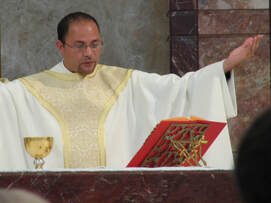 July is often referred to as the month of the Precious Blood of Jesus. Many people are unaware of this because it is not often highlighted, but it is important to meditate and ruminate* upon what an indescribably rich gift this is and to recognize its importance for our spiritual lives. Jesus said, “Unless you eat the flesh of the Son of Man and drink His blood, you do not have life within you.” (John 6:53-58) Through it Jesus offered everything we would ever need to find our way back to the Father from whom we have come. His blood offers sustenance in the worst of our sufferings and challenges, and it offers spiritual food to aid our growth in holiness. Any encounter with the Eucharistic Blood of Jesus and the bread become His Body is an entering into the totality of His Body, Blood, Soul, and Divinity, and it is personal contact with the Lord who becomes one with us through His humanity and then invites us to become one with Him through His divinity. 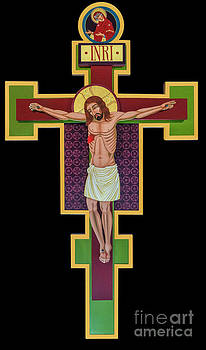 However, the Blood of Christ is far more powerful than we often realize. It contains the totality of Jesus, and therefore, it empowers us to minister as His disciples. Another important aspect of the power of His blood is that it enriches our ability to forgive when we do not think we are capable of it. A powerful example of the power of the Blood of Christ is witnessed in the experience of Immaculee Ilibagiza, a college student during the genocide in Rwanda who had to hide in order to survive. A local pastor hid her along with 7 other women, all Tutsis, in a 3x4 bathroom for 91 days. While in the cramped bathroom, she heard that her family had been murdered by a Hutu man simply because they were Tutsi. Filled with anger and grief she felt unable to forgive. Days later, while meditating on the crucifixion of Jesus as she prayed the Rosary, she saw herself kneeling at the foot of the cross, crying out to Jesus for help in giving forgiveness. During the prayer she ‘felt’ His blood dripping onto her head and heard His voice saying, “Forgive them, they know not what they do.” Enveloped by His love, she realized that this man was also one of God’s children. A few years later Immaculee returned to Rwanda and found that man. As she approached him, he asked her if she knew what he had done. Immaculee embraced him and then to his shock, offered him forgiveness. That is the power of the precious Blood of Christ. It enables us to do that which seems impossible; it sets us free, it heals, empowers, protects, sustains, sanctifies, and offers everlasting life. There is nothing that could ever be ‘manufactured’ or conceived in our minds or hearts that could ever do those things. The blood of Christ is the very life of God: it is His love which flows over and through us. 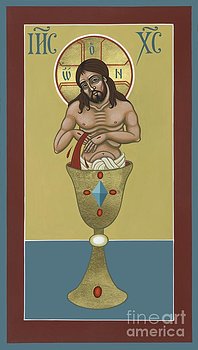 Although we cannot partake of the cup at this point due to issues of health,** we can be immersed in it through our participation in all the sacraments which flow from the Eucharist.*** It would be good to reflect upon the Precious Blood of Jesus, perhaps imagining that we are at the table of the Last Supper when Jesus gave this precious gift, or we can meditate upon being at the foot of the Cross as the blood and water flow forth from His side. When at the Sacrament of Reconciliation, imagine receiving a holy anointing of His blood flowing over you, “shaken down and overflowing… into your lap (Luke 6:38).” Ask Jesus to let His Precious blood flow over you when you are in need, whether you are suffering greatly or simply desire a boost in faith. Remember, there is nothing that can ever have more power than the Body and Blood of Jesus given for us, the ultimate gift of life. May we call upon Jesus, holding onto Him, joyfully giving thanks and praise for His Precious Blood! May we immerse ourselves in the power of His precious shed Blood! And may we find the strength and courage to offer mercy and love through the power of Jesus’ Blood! Let us meet in the Eucharist! Peace! ©Michele L. Catanese * To ruminate literally means “to chew on.” ** Let us be clear that the issue is the vessel and not the actual Blood of Christ. We must also remember that when we consume the consecrated bread we are in fact receiving the entire Body, Blood, Soul, and Divinity of Christ. Thus, we are receiving His fullness in the bread when we cannot partake of the cup. *** Catechism of the Catholic Church paragraph 1324: The Eucharist is “the source and summit of the Christian life. The other sacraments, and indeed all ecclesiastical ministries and works of the apostolate, are bound up with the Eucharist and are oriented toward it.” See also paragraphs 1365 and 1374 for an explanation of the Real Presence of Christ in the Eucharist. Also see paragraph 613 for the connection with the Blood of Christ and forgiveness of sin: we hear it said (that His blood was offered for the forgiveness of sins) in all of the Eucharistic Prayers which can be used at Mass. Listen for it at the consecration. Note: For more on Immaculee Ilibagiza go to https://www.immaculee.com/pages/about Images: 1. My photo, Buttermilk Falls, Ithaca, NY. 2. My photo, a priest praying the Eucharistic prayer, consecrating the bread and wine. (Used with his permission) 3. Icon, The Cross of Life - The Flowering Cross, by Fr. William Hart McNichols. You can purchase a copy of this icon in many different mediums at fineartamerica.com/featured/the-cross-of-life-the-flowering-cross-william-hart-mcnichols.html 4. Icon, La Sangre de Cristo, by Fr. William Hart McNichols. Similar to the above, https://fineartamerica.com/featured/la-sangre-de-cristo-242-william-hart-mcnichols.html Note: In compliance with GDPR rules, I wish to make it clear that I do not gather any information on any of my readers at any time. 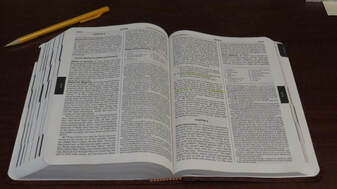 One of the things I love most about the Bible is that no matter how many times a passage is read, there is always something new to learn, a fresh insight to be had. The Scriptures enable us to do more than simply know about God; they aid us in getting to know Him more intimately because the Bible is God’s Word. Therefore, we are not simply passive when reading Scripture, but we actively pray and reflect upon what the passages contain. There are many ways of bringing Scripture to life, not the least of which is formal study. Even a judicious use of various forms of media can provide a way to be inspired by the stories. However, we must be careful since not all are good sources; indeed, there are many cringe-worthy, terrible renditions of biblical stories. However, there are also those that are quite well done and can provide helpful insights. For example, I was recently impressed by a scene in one of the better productions which pertained to Mary and Joseph ‘losing and finding’ Jesus in Jerusalem when He was a boy. When they finally located Him in the Temple area, Jesus asked why they were looking for Him and then added, “Did you not know that I must be about my Father’s work?” (Luke 2:41-52) * Experiencing this passage visually provided the insight that His questions were not intended as a rebuke, but rather that He was expressing surprise at His parent’s reaction, and that He, too, was learning something in the realization that it was not yet time for Him to do public ministry. Whatever it was, the Gospel says that Mary pondered Jesus’ question afterward, something that perhaps we should do, too: are we about our Father’s work? 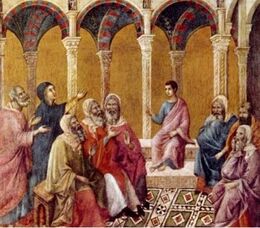 To continue with this example, the Gospel of Luke reveals that at 12 Jesus was aware that He had a specific mission which entailed doing His Father’s work, but that He was not yet cognizant of the time, place, or details of what that might be. But humbly obedient to the wisdom of His parents, Jesus returned to Nazareth to continue to grow in prayerful discernment so that He might know exactly what His Father’s work for Him was to be. It seems that wisdom and obedience were an important part of His learning experience. In other words, because of His humanity, (though also fully divine), even Jesus had to be taught to discern by listening to the wisdom of His parents, both of whom reflected and prayed over everything because of their love for God and their desire to do what He had set out for them. In so doing they set an example for Jesus. 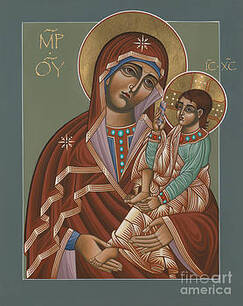 Another avenue for reflection upon this Scripture is through the Rosary, which can also provide insight into doing the Father’s work. Using the same passage, the text in which Jesus is ‘lost’ and ‘found’ in Jerusalem, we have a rich source for meditation: in both the Rosary of the Seven Sorrows of Mary, (the third of the seven sorrows) and in the traditional Rosary (the fifth of the Joyful Mysteries) we can gain multiple insights. In the former, the focus is on Mary’s intense sorrow in not knowing where Jesus was for three days, and in the latter the focus is on the joy of finding Jesus after those three days. The three days can be understood as symbolic of the three days between the death and resurrection of Jesus in which He is seemingly ‘lost’ in death and then is ‘found,’ in the beauty of His resurrection. Thus, this event is one that created both great sorrow and great joy for His mother. This indicates that doing the work of the Father can bring the suffering of sacrifice, but always leads to the great joy of rising with Christ in victory. Whatever our part in doing the work of our Father may be, there will be times when we will be confronted with great sacrifice and times when we will rejoice at seeing the work come to wonderful fruition.  The challenge is to recognize what work we are called to do in this present moment and to realize that it is our Father’s work, not ours. The basic call is the same for everyone: in all that we do, we are to “love our neighbor as ourselves” through humble service in works of mercy, treating everyone generously with respect, kindness, and when needed, forgiveness. Doing the work of our Father is rooted in the call to holiness, and to grow in holiness we need to pray. That is, we need to consult with the Father through prayer and the Scriptures, (particularly the Gospels), follow the example of the Son, and rely completely on the Holy Spirit for the appropriate graces needed in order to be about God’s work. The Lord gives everything we need: all we have to do is say ‘yes,’ continually praying and discerning so that the work is always about the Father and never about us. And finally, let us remember that we contribute to our Father’s work; we do not accomplish because this is His work and it takes the entire community working together to build the Kingdom. The Kingdom is built as a community, for the community. How consoling it is to know that the work does not depend on us individually, but rather it binds us to the Body of Christ! This is what it means to be a community of faith: together we are about our Father’s work.  May we spend time reading, studying, and praying with the Scriptures! May we find inspiration in the Bible to serve the Lord according to our call! May we grow in discernment, courage, and love for the Lord through our prayer with Scripture! And may we understand more fully the importance and beauty of being part of the Body of Christ! Let us continue to meet in the Heart of Jesus! Peace! ©Michele L. Catanese * -In the NABRE translation of the Bible Luke 2:49 reads, “Did you not know that I must be in my Father’s house?” I have chosen to go with the alternate translation of the verse which is explained in the footnote that states: “This phrase can also be translated, “I must be about my Father’s work.”” -The scene I referred to was found in “The Chosen” produced by Dallas Jenkins. It is magnificent, but keep in mind that Jenkins is not trying to provide a retelling of the Gospels, but rather is providing a sense of what the experience of being a disciple of Christ may have been like. ~ Another profound scene that changed completely how I saw a passage can be found in the film, “The Gospel of John.” While the film relies on a terrible translation of that Gospel, the filmmaker did a fantastic job of visually making up for what the translation lacked. The scene I am referring to in that film is when Jesus calls Nathaniel and tells him He saw him under the fig tree. The filmmaker captured a nuance that touched me deeply. So yes, good things can come out of the film industry! (Read the passage in John 1:43-51, particularly verse 46, to find my intended pun!) Images: 1. My photo of a Bible. 2. Painting, Jesus in the Temple at age 12 by Duccio di Buoninsegna, (died 1319) 3. Icon, Mother of God of Shuya, by Fr. William Hart McNichols. I chose this because if clearly depicts Jesus as teacher, seen in the scroll He is holding, yet He is obediently in His mother's arms. One can see sorrow in Mary's eyes, yet her love is also present, as seen in the tenderness of her hand on His foot. It can be found at fineartamerica.com/featured/mother-of-god-of-shuya-178-william-hart-mcnichols.html 4. Painting, The Oarsmen by Gustav Caillebotte. To row a boat, both oarsmen must work together or they will go in circles. 5. My photo, flowers in a garden at a castle in Scotland. I was thinking of St. Thérèse of Lisieux who said she wanted to be a little flower in God's garden. One could think of God's garden as the community in the Kingdom of God. Note: In compliance with GDPR rules, I wish to make it clear that I do not gather any information on any of my readers at any time. |
Heart Speaks to Heart
|

 RSS Feed
RSS Feed

